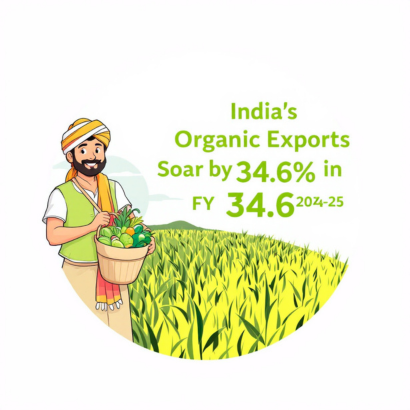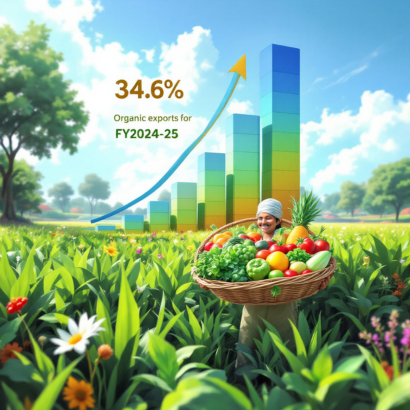India’s organic agricultural sector has taken a remarkable leap in the global market, with exports rising by an impressive 34.6% in the fiscal year 2024–25. Valued at USD 665.96 million, this significant growth not only reflects a rising global appetite for clean, green, and chemical-free food, but also underlines India’s evolving position as a trusted supplier in the organic segment.
This surge highlights the increasing relevance of sustainable farming practices and India’s growing capabilities in meeting strict international quality standards.
The Driving Forces Behind the Growth
Several factors have contributed to this surge:
- Increased Awareness: Both domestic producers and international consumers are showing heightened awareness toward health and sustainability. Organic food is no longer niche—it’s becoming mainstream.
- Government Initiatives: Schemes like the Paramparagat Krishi Vikas Yojana (PKVY) and Mission Organic Value Chain Development have played crucial roles in supporting farmers in adopting organic practices.
Enhanced Certification and Traceability: India has strengthened its certification processes under the National Programme for Organic Production (NPOP), making it easier for exporters to access global markets with credibility.

What’s Being Exported?
India’s organic export basket includes a wide range of products:
- Oilseeds like soybean and sesame
- Cereals such as rice and wheat
- Tea and Coffee
- Fruits, Vegetables, and Processed Foods
- Spices and Herbs, which have seen rising demand for their medicinal and culinary uses
These products are being shipped to major global markets including the USA, EU, Canada, and parts of East Asia, where consumer demand for health-conscious and sustainably produced foods is on a strong upward curve.
A Win for Indian Farmers
Beyond the statistics, this growth is a win for India’s farming community—especially small and marginal farmers who are gradually transitioning to organic methods. With the right support, this sector can not only improve rural incomes but also play a key role in environmental sustainability.
Organic farming reduces dependency on synthetic fertilizers and pesticides, improves soil health, and promotes biodiversity. This dual benefit of economic and ecological gain is positioning organic agriculture as the future of farming.
What Lies Ahead
With global trends steadily favoring organic and sustainable consumption, India is poised to strengthen its position further in the international organic market. Exporters and farmers will need to focus on consistency in quality, logistics efficiency, and brand positioning to sustain this momentum.
If this growth trajectory continues, India could emerge not only as a major exporter of organic products but also as a leader in the global movement for responsible and sustainable agriculture.


